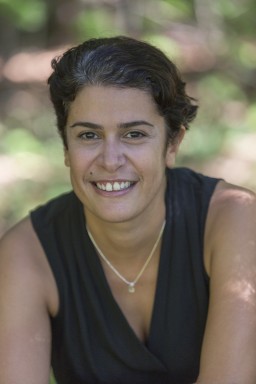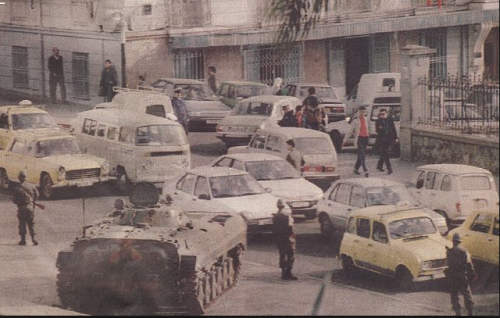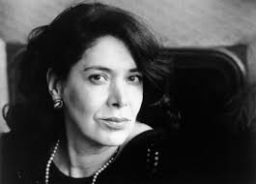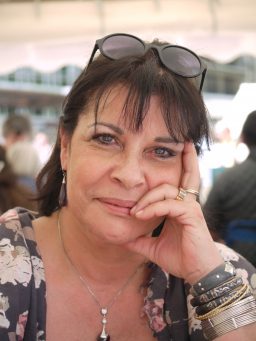The Algerian Women Writers Who Resisted Tyranny
By Tom PorterAssistant Professor of Romance Languages and Literatures Meryem Belkaïd held a lunchtime faculty seminar recently to shine a light on some of the hardships suffered by public intellectuals during the Algerian civil war of the 1990s.

Belkaïd, who is herself Algerian, focused particularly on the impact of two pioneering feminist scholars, Maïssa Bey and Assia Djebar. “Djebar was the more famous of the two,” said Belkaïd, “but they’re both really interesting because they tried to start a dialog at a time when Algeria was suffering a violent identity crisis.
“In the 1990s, Algeria had its own ‘Arab Spring,’ years before it happened elsewhere,” explained Belkaïd. “The country was ruled by an increasingly repressive regime in the years following independence from France in 1962, and by the 1980s the economy was in steep decline. In 1988 violent protests were followed by the collapse of Algeria’s one-party system, under the Front de Libération Nationale, or FLN.” For a short while, it seemed that democracy would prevail, as freedom of speech was permitted for the first time in modern Algerian history, and the political field was opened to other parties. “But it all came apart in 1991, when an electoral victory by the Islamist party prompted a military coup as the army cancelled the elections.”
A ten-year civil war ensued, said Belkaïd, during which the Islamic forces of opposition became swiftly radicalized. The Islamist groups’ first targets were symbols of the Algerian past, of the struggle for independence. “So the tombs of so-called ‘martyrs’ were vandalized. Then they started killing intellectuals—writers and journalists, and also women.”

Belkaïd said public intellectuals were targeted because they symbolized a different way of thinking. “They were put in the same category as atheists, secularists, and communists. That’s because these people represented a polyphonic way of understanding the world, while the Islamists wanted to impose just one Algerian identity. Nor were these intellectuals protected at all by the Algerian state,” she added, “which tells you the government had no interest in promoting pluralism of values and ideas.”

The left wing, and the democrats, as a political force, was weak at this time, politically and financially, explained Belkaïd, snuffed out between an authoritarian dictatorship on one side and radical Islamists on the other. The violence was extreme. “In 1993 for example, during the month of Ramadan, almost every day someone was killed, either in their home, or in the workplace. A lot of Algerians had to either leave the country or live in fear. It was a dreadful time to be a public intellectual and a free thinker.” Ordinary Algerian citizens also paid a heavy price during the war, she said, with entire villages sometimes massacred, like in Bentalha in 1997.
It was in this climate that Bey and Djebar continued their writing. Maïssa Bey, who was born in 1950, published her debut novel in 1996. She went on to receive the prestigious Grand Prix from the Société des Gens de Lettres for her 1998 story collection, Nouvelles d’Algérie. She went on to receive several other accolades for her writing, and in 2000, while the civil war was still raging, established a cultural association of Algerian women. Assia Djebar, who died two years ago at 78, was already an established writer and voice of feminism in Algeria by the time the war started. Among her achievements was winning the Neustadt International Prize for Literature in 1996 for her contribution to world literature, and she was elected to the Académie française in 2005. Both women wrote primarily in the French language.

“They tried to find a rational middle ground in Algeria between the oppressive state and Islamic fundamentalism,” said Belkaïd. “They sought balanced answers to the question of Algerian identity.” Their impact, she said, is difficult to measure directly and should be considered in the long run, as part of a wider discussion. To illustrate her point, Belkaïd quoted another prominent Algerian author, Mohammad Dib (1920-2003). “He wrote that in times of crisis, literature is more important than ever, even though it doesn’t have an immediate impact. In fact it’s because it doesn’t have an immediate impact that it’s so important.”
The Algeria of today is a lot more peaceful, said Belkaïd, but still far from perfect. A peace agreement was struck between the state and the Islamists in 2002, granting amnesty to the former Islamic rebels in return for an end to hostilities. “Algeria is much safer today, but it’s still not a democracy. We have had the same president for more than eighteen years. He was supposed to be elected only twice, but he keeps amending the constitution!”
Furthermore, she added, there remains deep-seated institutional corruption in Algeria, something she put down to the country’s extensive oil reserves. “On the positive side though, there is now a very dynamic press in Algeria,” Belkaïd said, “and there is some freedom of speech, unlike during the 90s. For this, we can, to a large extent, thank pioneering intellectuals like Bey and Djebar, who kept writing during the civil war years, risking persecution from both sides.”